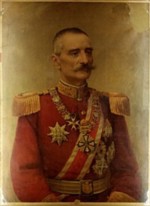Shkodër
We arrived in Shkodër in Albania to find that at the Alis Hotel, in the old town, parking is at a premium. Fortunately,, one of the hotel staff - the manager (?) had a vehicle parked across the street and gave up his space to our aforementioned Fiat - the white car in the picture.
We then set out to find a currency exchange - a mission that turned out to be like a treasure hunt. Anyway, we walked about 10km and found two large mosques; a couple of parks; and lots of restaurants. Albania too has high unemployment, comparable to Greece.
Once part of the Ottoman Empire and not a part of Yugoslavia, many Albanians are Muslim but Christians of various hews make up a significant minority. See Saint Teresa of Calcutta above.
This was evident away from the town centre but in town the place was buzzing after dusk and we had to fight for a table in one of the many quite up-market restaurants. Many of the cars in the street were up-market too.
Back at the hotel the Wi-Fi had a (temporary?) fault. Despite a change of room, it was only available in the public areas. It spoiled our experience of what was otherwise a very nice hotel.
Our travel guide told us that Shkodër is one of the most ancient cities in the Balkans and the fourth most populous city in Albania. It's said to exert strong influences in the culture, religion, arts and entertainment of northern Albania.
Part of the old town of Shkodër - from the Alis Hotel - ours is the white Fiat
On the positive side the car had space for our two big and two small bags
Due to its strategic position with access to the Adriatic Sea and the Italian port cities there has been a fortified settlement here since Illyrian times with coins found here in Rozafa Castle, which stands above the city, from the time of Queen Teuta 231-227 BCE.
Rozafa Castle - There have been fortifications here since the 3rd century BCE

